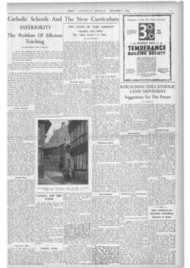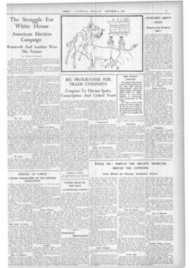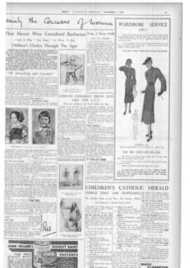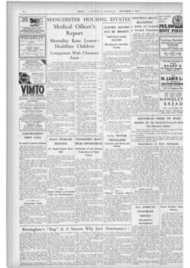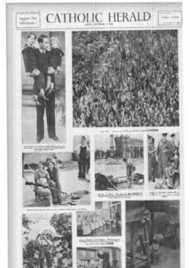Page 7, 4th September 1936
Page 7

Report an error
Noticed an error on this page?If you've noticed an error in this article please click here to report it.
Tags
Share
Related articles
Abortion And Elections
September Is September 21
New Labour Party For Australia
Two Parties Talk Catholic Voters'
The
News That Interests and Matters AUGUST 28 AT HOME
SEPTEMBER
Labour and Spain
A meeting of the Parliamentary Labour Party, the National Executive of the Labour Party and the General Council of the Trades Union Congress met at Transport House to consider the Spanish situa tion. Major Attlee, M.P., presided, and during the discussions it became obvious that few were in favour of intervention. Sir Stafford Cripps, M.P., urged that Parliament should be recalled, but this suggestion was not very well received. Finally, a manifesto was issued, supporting nonintervention in the Spanish war, but urging the vital necessity for the maintenance of a close watch upon the operations of the arms embargo in Italy and Germany and the actions of these countries.
Atlantic Record Broken
The Queen Mary broke the eastbound North Atlantic record with an average speed of 30.63 knots per hour as against the Normandie's previous record of 30.31 knots per hour attained last year. The total crossing time is also the shortest yet recorded and amounted to 3 days 23 hours 57 minutes.
Spanish Antbas'sador Resigns
Senor Lopez Olivan, the Spanish Ambassador to Great Britain, has announced "his resignation. Senor Olivan was widely respected both in Spain and abroad, and was only recently appointed to succeed Senor Ramon Perezy Ayala. A man of strong Republican convictions, he is understood to have been deeply affected by the disastrous civil war in Spain.
Compulsory, Speedometers
The Minister of Transport announces that all vehicles permitted to travel at a speed exceeding 20 m.p.h. must in future be equipped with a speedometer. This Measure comes into force on 1st October and has been framed with the object of lessening the causes of the numerous road disasters.
Labour Deputation and Spain
Mr. Anthony Eden, the Foreign Secretary, received a deputation consisting of Sir Walter Citrine, Mr. Arthur Greenwood, Mr. James Middleton and Mr. Arthur Galles, representing the various sections of the Labour movement. The deputation, which had already seen Mr. Eden with regard to the Spanish situation, asked the Foreign Secretary for reassurances as regards the application of the principle of non-intervention in Spain, with 'particular reference to Portugal.
Jarrow
The Lord Mayor of Newcastle (Alderman Locke) is organising a united Tyneside petition to the Government on behalf of Jarrow. All parties are unanimous that Government intervention alone can bring about a re-establishment of industry in this most distressed borough. The Mayor of Jarrow has issued an appeal exposing the tragic situation and is organising a march to London, due to leave on October 5.
Anglo-Egyptian Treaty Signed
The Anglo-Egyptian treaty was signed at the Foreign Office. Among the signatories Were Mr. Eden, Mr. Ramsay MacDonald, Sir John Simon and Lord Halifax for Great Britain, and Nahas Pasha, Mahmoud Pasha and Ismail Sidky Pasha for Egypt. Mr. Eden and Nahas Pasha subsequently in their speeches referred respectively to the inemery of Lord Cromer and Zaghlul Pasha, while a tribute was also paid to Sir Miles Lampson.
The treaty provides for a military alliance between Great Britain and Egypt. The administration of the Sudan, the future abolition of capitulations, special military privileges for British troops, the protection of the Suez Canal and the safety of foreigners are other points dealt with by this treaty.
Derbyshire M.P. Dies
Mr. Alfred Holland, Labour M.P. for the Clay Cross division of Derbyshire, has died of meningitis, at the age of 36. He secured a majority of 16,000 over his Conservative opponent, Miss Bridget Jackson, at the last General Election. Clay Cross was represented until his death by the late Mr. Arthur Henderson.
Foreign Visitors' Statistics
The July figures indicating the number of foreign visitors showed a substantial increase over the figures for 1935. Of these visitors, 66,000 came on holiday and 8,000 on business, representing an increase of 11,000 over the figures for July, 1935. Visitors from the United States amounted to 22,000, and by far the next highest contingent came from France with a total of 16,000, while Germany took third place with a total of 7,000. The August figures are expected to beat all records.
Co-operators and Spain
Mr. H. J. May secretary of the International Co-operative Alliance, stated to the British Co-operative movement that an appeal for help from Spanish co-operators was inevitable in the near future. He indicated that societies should vote sums for this purpose as a reserve, but stated that it would be premature to go further until such an appeal were actually received.
Bedwas Colliery Dispute
It is hoped that a strike may yet be averted in the Bedwas dispute. The South Wales Miners' Federation have made an offer to Sir Samuel tristone, chairman of the Bedwas Company. Should no settlement be reached by September 7, 120,000 South Wales miners will strike. The dispute involves the recognition of the South Wales Miners' Federation by the Company.
Anti-Jewish Riots
Jewish ex-Servicemen, marching to an anti-Fascist demonstration in London, were jeered at by onlookers, who shouted
anti-Semitic slogans. A free fight developed and several were injured during disorders, which were only quelled with difficulty by the police. Minor rioting broke out again after the meeting, but this was of a less serious nature.
Dr. Schacht in Paris
The Governor of the Reichsbank, Dr. Schacht, arrived in Paris to return the visit recently paid to him in Berlin by M. Lakeyrie, the newly-appointed Governor of the Bank of France. He met M. Leon 131um and other French Ministers and discussed various outstanding problems, chiefly of a financial nature, with them. He stated that he had not come to discuss political problems, but expressed himself as satisfied with his visit and conversations.
Nazi Terror in Danzig
Two Labour M.P.s, Messrs. James Griffiths and Arthur Jenkins, have returned from an investigation of conditions in Danzig and are submitting a report to Trades Union Congress. They emphasise the open terrorism and the fact that terrorist methods are also brought to bear upon all would-be visitors to the High Commissioner, Mr. Sean Lester, to whose impartiality and courage tribute is paid. In their report they urge that steps should at once be taken by the League to hold free elections, check the elaborate Nazi espionage system and ensure liberty and democratic rule.
Unemployment in Germany
Dr. Syrup, head of the German Labour Exchanges, states that unemployment in Germany has now been reduced to little over a million. He indicated that this was due primarily to the gigantic boom in the armaments industry and also to the extension of the period of military service to two years. Dr. Syrup also claimed that Herr Hitler would thus by 1937 have fulfilled his pledge to abolish unemployment within four years, as the last million unemployed could not be considered a real or important factor in the economic life of the nation.
German Bishops and State
A pastoral letter was read in all Catholic churches throughout Germany, offering the Chancellor hearty co-operation in the fight against Bolshevism, but at the same time emphasising the impossibility of this unless full scope and freedom were accorded to Christian principles. In Bavaria the bishops issued a supplementary note, in which bitter complaint was made of Nazi pressure and menaces against parents wishing to send their children to Catholic schools.
New Rumanian Government
The Rumanian Government has been rearranged so as to correspond more closely to the policy and aims of the Liberal party and M. Titulesco, who has for so many years been Minister of Foreign Affairs, has been replaced by M. Tataresco. It is stated that the new Government intends to deal firmly with private extremist organ isations. Rumania's foreign policy will continue unchanged, but the absence of so world-famous a statesman as M. Titulesco has aroused wide comment.
Norway and Trotsky
The Soviet Government has sent a note to the Norwegian Government asking for Trotsky's expulsion on the score of his anti Soviet and revolutionary activities. The Norwegian Government is not prepared to comply with this request, but Trotsky is henceforth to be subjected to strict police censorship and supervision as evidence has been forthcoming that he has been organ ising secret revolutionary activities. He refused to sign a pledge to abstain from such activities.
Polish General in Paris
General Rydz-Smigly, Chief of Staff of the Polish army, has arrived in Paris to return General Gamelin's recent visit to Warsaw and to witness the army manoeuvres. He was accorded almost royal honours and was received by M.
Blum. Political and military significance is attached to this visit and he was warmly welcomed by Frenchmen of all shades of political opinion.
Anti-Trotskyist Hunt in Russia
A wholesale purge of elements suspected of Trotskyist sympathies is proceeding apace throughout Russia. Radek and Bukharin are under police supervision. Those arrested include Katayeff, the writer, Olberg, General Punta, the Soviet military artache in London, and Sokolnikoff, the former Soviet Ambassador to Great Britain. Madame Sokolnikoff has been dismissed from the Communist party. A particularly drastic purge is being applied to the Satte Bank, where many Trotskyist cells are stated to have been found. Many Army leaders are also said to be involved in the purge.
Spanish War and Foreign Countries
Italy, Germany and Portugal (the latter after British and French pressure) have now made effective the embargo upon arms to Spain. Eighteen more countries have been asked to join in this embargo. Meanwhile, Mr. Eden has written warmly approving the efforts of the foreign diplomats accredited to Madrid to humanise the war. striving for a mitigation of the suffering of the civil population and the protection of works of art and famous buildings.
Spanish War : Progress
Little change is visible in the position in the Spanish civil war. During the last week the insurgents have attacked Ronda, Malaya, lrun and San Sebastian, but these attacks have been repulsed. Particularly fierce bombing is reported from the two latter towns, which are unlikely to be able to hold out much longer. Refugees are pouring in thousands over the frontier and cases of appalling atrocities continue to be
reported from both sides. Minor skirmishes have occurred in the mountains near Madrid. Fierce, but indecisive, fighting is reported in Estremadura, while the Rio Tinto area is now said to be in the hands of the insurgents. Madrid has been repeatedly bombed.
blog comments powered by Disqus




